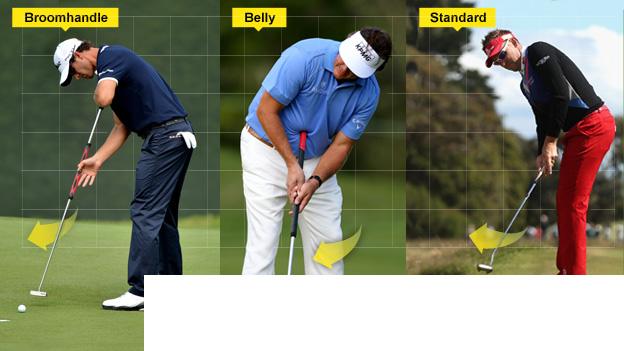Putting rule change sparks debate as PGA pitches in
- Published
- comments

It would appear the PGA Tour has staged an embarrassing U-turn over the ban on anchored putting techniques which comes in at the start of 2016.
The Tour has issued a statement to say that it will adopt the controversial rule change, despite initially voicing opposition to the move.
But the 500-word missive accepting the rule being brought in by the game's governing bodies - the R&A and the United States Golf Association - is laced with political language that may have bigger implications going forward.
By initially saying they saw no need for change, the PGA Tour was appeasing the belly and broomhandle brigade among their players.
This year's Masters champion Adam Scott and South African Tim Clark have led the opposition campaign.
The words of Clark in particular were significant in persuading the Tour to make public their reservations at the end of the 90-day consultation period after the changes were first announced.
So this was Tour commissioner Tim Finchem publicly standing up for his members, but all along he knew the consequences of his organisation shunning the rule-makers could prove very serious for the game at large.
In truth, the proposals were always going to be adopted - and now the onus is on Clark and other players in the same situation to consult their own legal teams if they are to continue their fight.
"The PGA Tour policy board acknowledged that the USGA's ban on anchored strokes, known as Rule 14-1b, will apply to PGA Tour competitions beginning on 1 January, 2016," said this week's statement.
But there was still room for some Finchem saber-rattling. The statement added: "The policy board also passed a resolution strongly recommending the USGA consider extending the time period in which amateurs would be permitted to utilise anchored strokes beyond 1 January, 2016."
Quite why the PGA Tour, whose remit is to run a professional circuit, is entering a debate about the amateur game is open to question.
The answer is that they are appeasing the PGA of America (representing US club pros) who vehemently oppose the move to outlaw putting techniques that use a single anchor point on the body.
"In making its decision, the policy board recognised that there are still varying opinions among our membership," Finchem said.
Anchoring of putters banned from 2016
"But, ultimately, it concluded that while it is an important issue, a ban on anchored strokes would not fundamentally affect a strong presentation of our competitions or the overall success of the PGA Tour.
"The board also was of the opinion that having a single set of rules on acceptable strokes applicable to all professional competitions worldwide was desirable and would avoid confusion.
"The policy board continues to believe that extending the time period the ban would go into effect for amateurs would be beneficial for golf participation and the overall health of the game," Finchem added.
Of even more significance was the way the commissioner ended his statement. He issued a warning shot to the USGA and R&A regarding future rule changes.
"We have been assured by the USGA that as we move forward we will have an open and effective communication process on a number of levels with the decision-makers at the USGA," he said.
He goes on to say there will be an "open door of communication" between his office and that of the USGA bosses to influence future rule changes.
These may well surround moves to limit the distance the ball travels, because Finchem knows these would be fought by manufacturers who have a significant stake in the professional game.
In short, Finchem has sought to find favour with all sides. He has appeased players with initial opposition, while the PGA of America get support with the call for later implementation in the amateur game.
But, most importantly, he has enabled the rule-makers to get their way - and that will help his position in future arguments over the running of the game.
The statement ends by saying: "Such a process will ensure that our position is fully and carefully considered and addressed in future rule-making."
This was no U-turn, it was an exercise in increasing the influence of the PGA Tour.
- Published1 July 2013
- Published30 June 2013
- Published30 June 2013